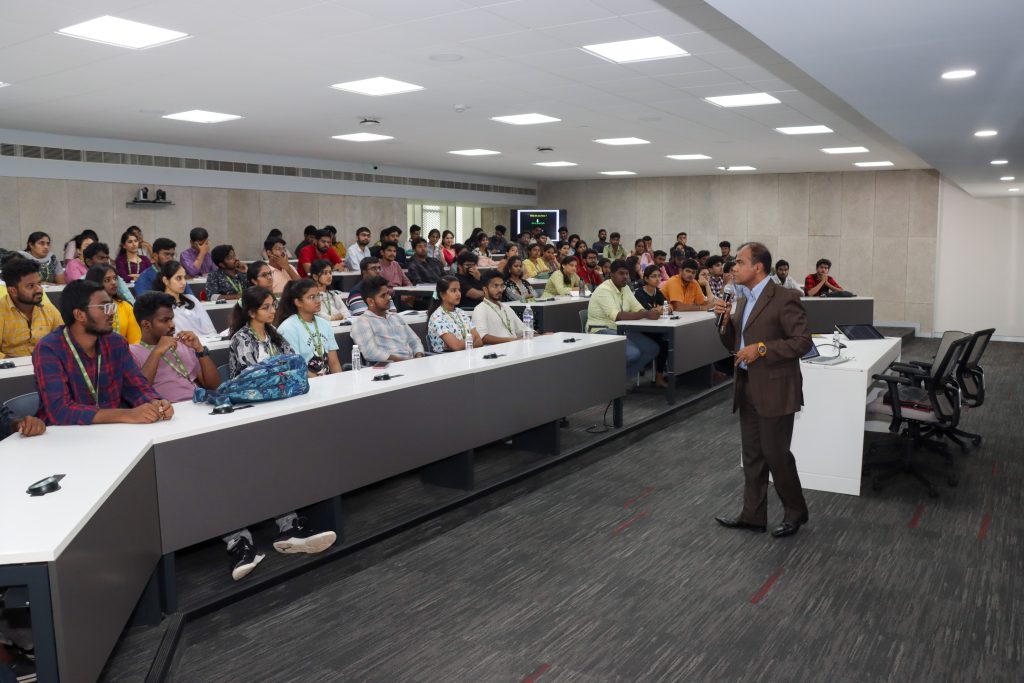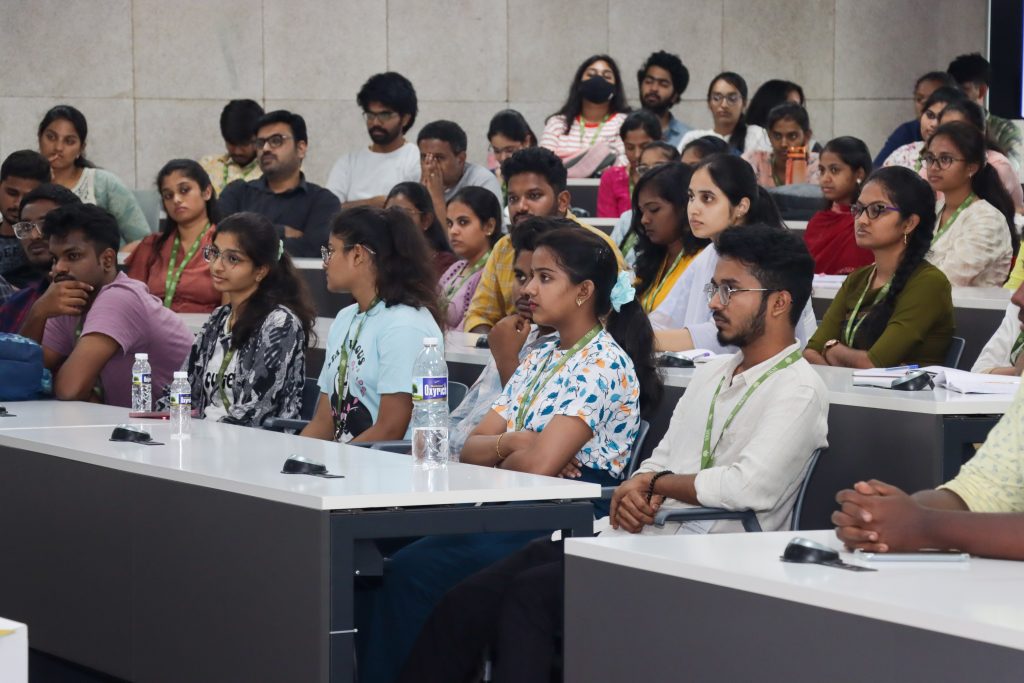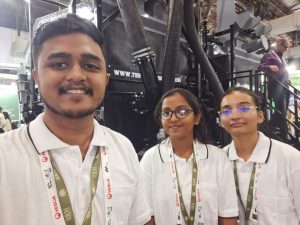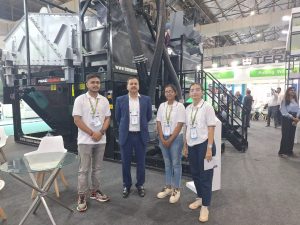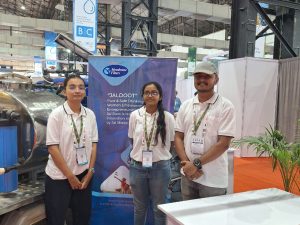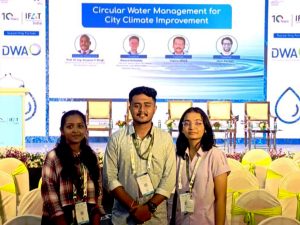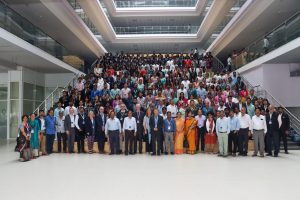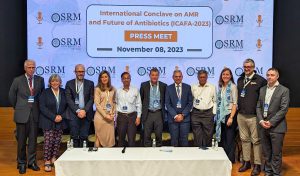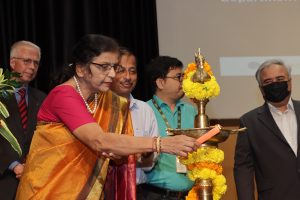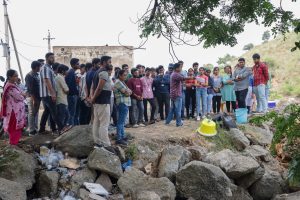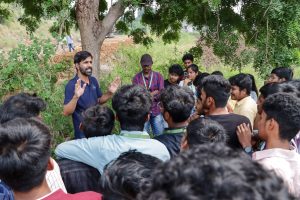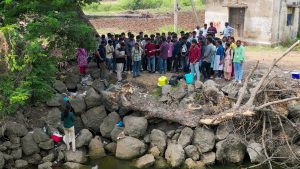Research Fellowship from Humboldt University of Berlin
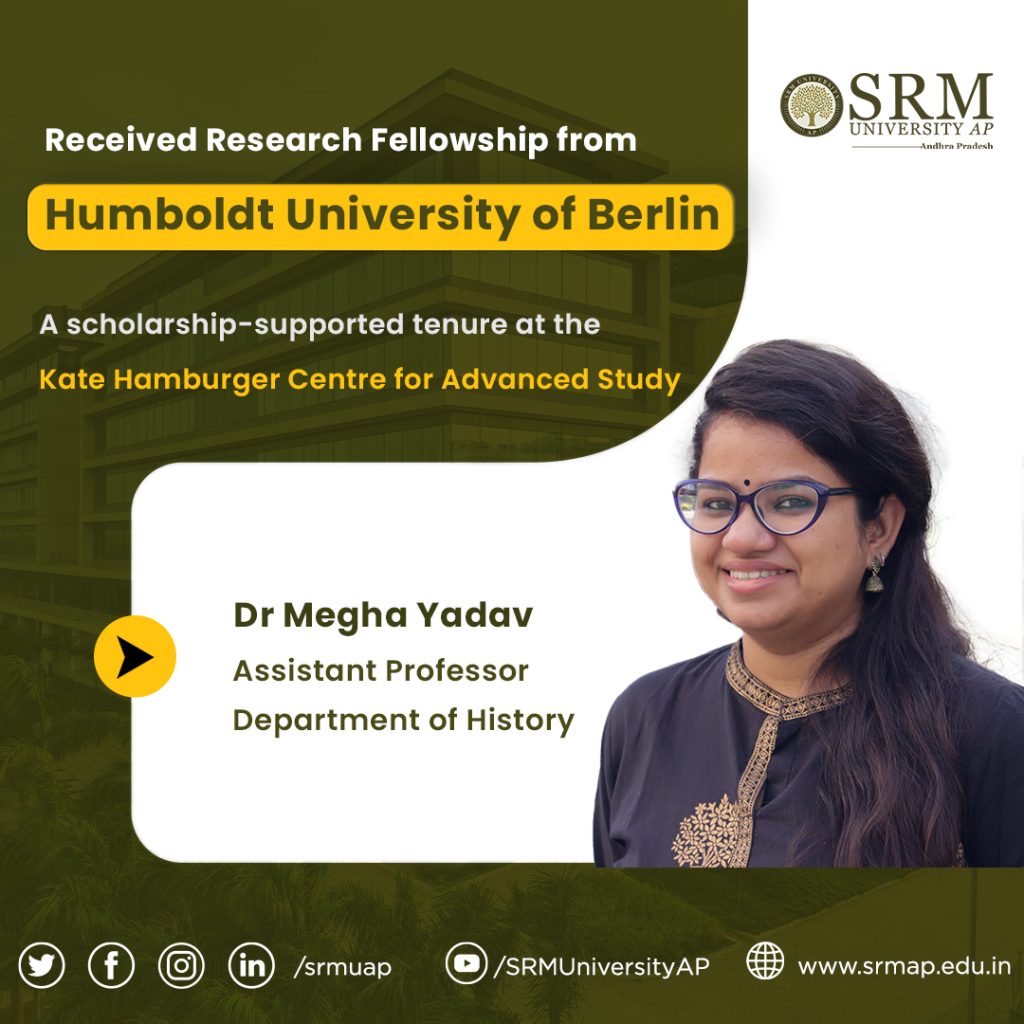
Dr Megha Yadav has received a prestigious fellowship from the Käte Hamburger Centre for Advanced Study, inherit.Heritage in Transformation, Humboldt Universität Zu Berlin, Germany. The fellowship allows for the undertaking of the research project, Visualising the Tradition, Preserving History: Material Practices in Tibetan Buddhism. This project takes an initiative to understand the ideas of heritage and history among the Tibetan Buddhist community by looking at the visual material and its heritage in Tibetan society to reach a nuanced picture of Tibetan history and heritage which keeps the Tibetan community at the centre of this understanding.
The project will attempt to understand the ways and methods of remembrance, preservation, and transmission of what Tibetan Buddhists consider to be their history. Most academic works have utilized Buddhist textual traditions to talk about Tibetan society, which has the inherent limitation of being one-dimensional. As a point of entry, this research will focus on thangka paintings as they create a very intimate window to people’s way of thinking about themselves, their universes, and their personal history. It was a ‘material’ to be showcased in public spaces, notably monasteries. It was meant for everyone to see, pay their respects, and take the image back with them in their minds and hearts. In a sense, these paintings were a showcase for the Tibetan Buddhist community.
This project will also pay attention to the changes brought about by 20th-century events, most notably colonization and the exile of the Dalai Lama and many Tibetans by inquiring into the changes brought into the idea and making of thangka paintings, raising questions about patronage, method, and content in the 20th century. An equally important intervention in the method and content of these paintings came with the spread of digital media platforms. While digital media has ‘democratised’ the making of thangka paintings, the question remains: what has it done to the process of making a thangka? How has the value associated with the paintings, as well as their making process, been changed by the technical medium? Has it impacted the content of these paintings? More importantly, what kind of changes have come into the community’s understanding of their past and present? These and any other issues that may come up during research will be addressed.
- Published in Departmental News, History Current Happenings, History News, News
MSc Environmental Science Students Secure Paid Japanese Internship
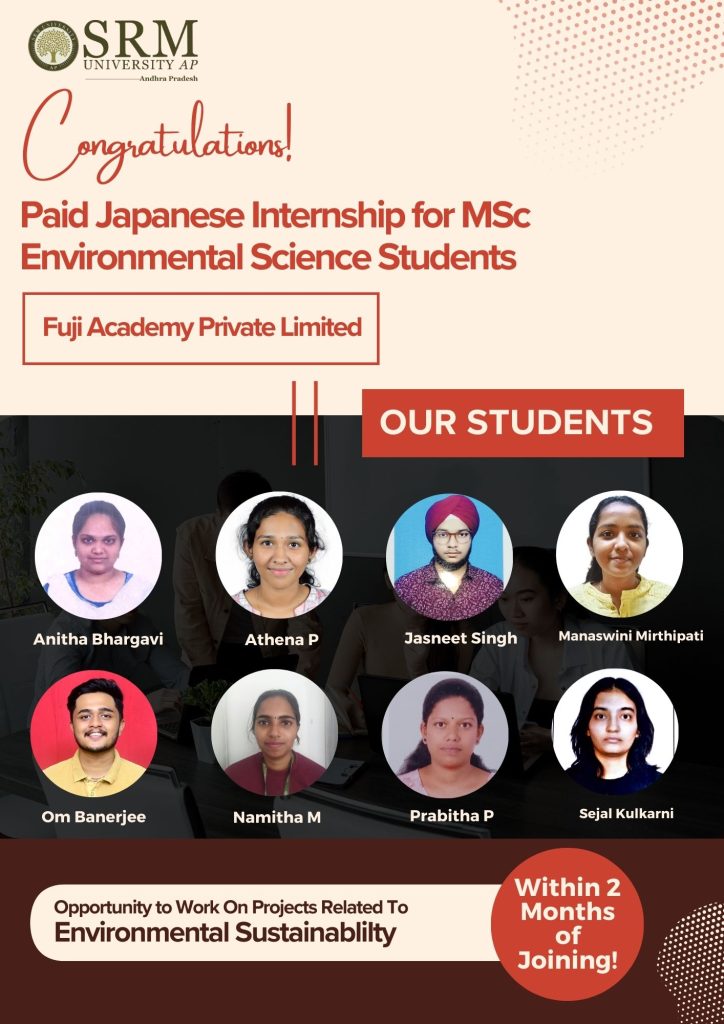
The Department of Environmental Science and Engineering takes pride in announcing that 8 students of MSc Environmental Science programme have bagged a paid internship in the Fuji Academy Private Limited, a prestigious Japanese company. The students shall work on projects related to environmental sustainability and participate in various engaging activities like workshops and training sessions, in addition to networking with different stakeholders in the sustainability sector. It is important to note that the students secured this internship within 2 months of commencing their MSc programme.
- Published in Departmental News, ENVS News, News, Students Achievements
Secularity Unveiled: A Critical Analysis by Prof. Vishnupad
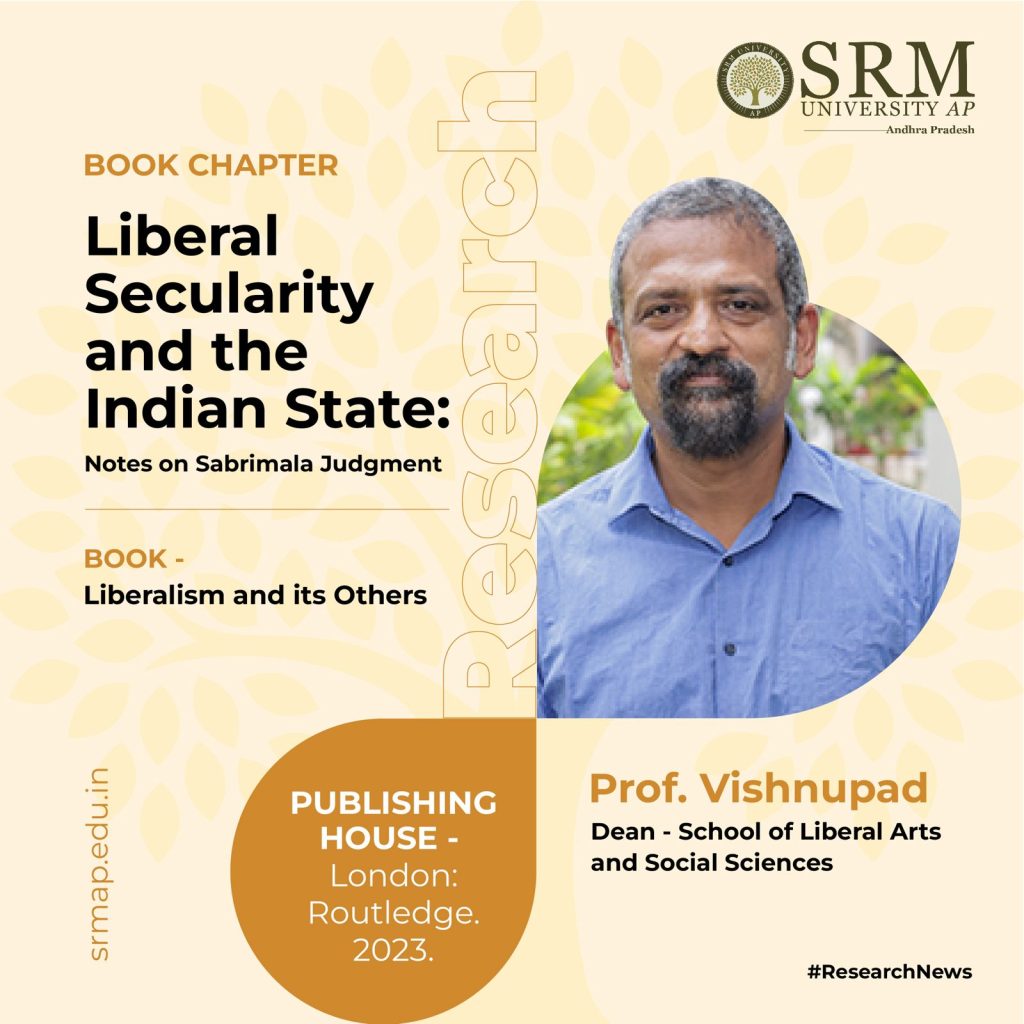
Prof. Vishnupad, Dean – Easwari School of Liberal Arts, has published his latest book chapter, “Liberal Secularity and the Indian State: Notes on the Sabrimala Judgment,” in the prestigious book “Liberalism and its Others”. The intriguing essay explores the complexities of modern secularity in liberal and postcolonial governments and navigates the delicate tango between the political and the religious. The book chapter is a scholarly investigation that maintains the importance of politics over religion while addressing the intricate dynamics of distance to closeness, neutrality to autonomy, and tolerance to publicity. Prof. Vishnupad challenges traditional knowledge, pushing to embrace ethical secularity’s dedication to discourse, transcending political and religious hierarchies.
This stimulating work is a light of intellectual engagement that will affect discussions in the fields of political philosophy, liberalism, and the state’s relationship with religion. Dive deep into these issues as we consider the nexus between politics and faith.
- Published in Departmental News, Liberal Arts News, News, Research News
Innovative Study on Microplastics in Groundwater Published
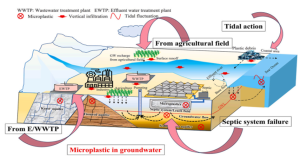 Dr Kousik Das and Dr Deep Raj, Assistant Professors in the Department of Environmental Science and Engineering (EVSE) at SRM University AP, along with Dr Uttiya Dey (Post-doc) and PhD Scholar Mr. Mijanur Mondal, have achieved a significant milestone with the publication of their research paper, “Microplastics in groundwater: An overview of source, distribution, mobility constraints and potential health impacts during the Anthropocene.
Dr Kousik Das and Dr Deep Raj, Assistant Professors in the Department of Environmental Science and Engineering (EVSE) at SRM University AP, along with Dr Uttiya Dey (Post-doc) and PhD Scholar Mr. Mijanur Mondal, have achieved a significant milestone with the publication of their research paper, “Microplastics in groundwater: An overview of source, distribution, mobility constraints and potential health impacts during the Anthropocene.
This pioneering work has been published in the esteemed journal “Groundwater for Sustainable Development,” a Q1 journal with an impressive Impact Factor of 5.9. The paper offers a comprehensive overview of the sources, distribution, mobility constraints, and potential health impacts of microplastics in groundwater, contributing valuable insights to the scientific community.The research team’s dedication to advancing environmental science and addressing crucial issues such as microplastic pollution underscores SRM University AP’s commitment to impactful research and innovation.
Abstract
Microplastics (MPs) are the tiny particles of plastic of > 5 mm in diameter that have already been detected in various environmental matrices like soil, sediment, and surface water, and recently in groundwater also. The occurrence of MPs in groundwater depends up on the transportation through recharge and may controlled by source and local hydrogeology, and partly on the process of surface water-groundwater interaction (SW-GW). Groundwater recharge from agricultural stagnant water, losing streams near dumping sites and agricultural fields, effluents from wastewater treatment plants, septic system failure, etc., are the potential sources of MPs in groundwater. The factors like sea level rise and tidal pumping are among the major factors that may control the migration of MPs in coastal aquifers, along with the physical and chemical properties of the aquifer media. These MPs have another ecological concern as they can adsorb persistent organic pollutants as well as heavy metals and transfer them to animal tissues through the food chain. No such study has been done on the existence, profusion, or environmental factors that contribute to MP pollution in the groundwater in relation to the present climate change scenario. Understanding the extent of MP contamination in groundwater systems is necessary for developing effective management strategies and minimizing their impact on the environment and human health. This study focuses on the source along with the controlling factors of the migration of MPs towards groundwater, including the effect of climate change.
Citation
Dey, U.,Raj, D., Mondal, M., Roy, P., Mukherjee, A., Mondal, N.K. and Das, K. (2023). Microplastics in groundwater: An overview of source, distribution, mobility constraints and potential health impacts during the Anthropocene. Groundwater for Sustainable Development. 23: 101036
Practical implementation and social implications of the research
Microplastic pollution is among the recent emerging pollutants which is still understudied. n. Studies are being conducted mainly focusing the MP contamination in surface water, marine environment and soil, and very limited studies are available to address the source of MPs in groundwater. Even there is lack of standard methods for the effective detection, both qualitatively and quantitatively, of MPs. However, no such study has been done on the existence, profusion, or environmental factors that contribute to MP pollution in the groundwater in relation to the present climate change scenario. As groundwater is a major source of drinking water worldwide, it is of immense importance to enquire more about the source, transport pathways, controlling factors and human health effects of MPs for the safeguard of this valuable resource. Understanding the extent of MP contamination in groundwater systems is necessary for developing effective management strategies and minimizing their impact on the environment and human health. Our study was conducted to mainly focus on the source along with the controlling factors of the migration of MPs towards groundwater including the effect of climate change. The findings of our study would provide valuable insights into the characteristics of MPs in the environment and suggest efforts to mitigate their impact on ecosystems as well as on human health.
Collaborations
The collaborators in this present study are:
- Prof. Abhijit Mukherjee, Department of Geology and Geophysics & School of Environmental Science and Engineering, IIT Kharagpur, West Bengal
- Prof. Naba Kumar Mondal, Department of Environmental Science, The University of Burdwan, West Bengal
Future research plans
Microplastic is one of the recent emerging pollutants which is still understudied. The research has just started to detect MPs in different environmental media as well as to establish effective removal technologies. Our future plans with MP research are as follows:
- To measure the MPs concentration in different coastal areas in India, as the oceans are the major sink for any pollutants, to obtain baseline information about the contamination load
- To detect how much amount of MPs are coming through the major rivers by linking the land use and land cover pattern so that the major sources can be detected
- Detection of MPs in the freshwater aquifer to adopt effective management strategies to safeguard the groundwater
- Development of effective and environment-friendly MP removal technologies
- Published in Departmental News, ENVS News, News, Research News
Leadership Talk by Mr Satakarni Makkapati
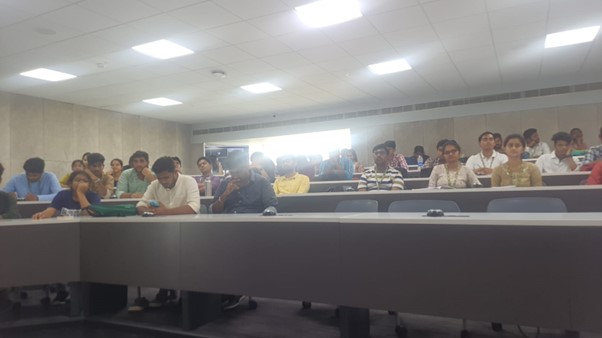
On October 12, 2023, Paari School of Business hosted a Leadership Talk by Mr Satakarni Makkapati, highlighting the critical role of effective leadership in navigating challenges and driving success. Mr Satakarni shared insights on mentorship, change management, the power of teamwork, exercising authority with care, and leading with proactivity, providing invaluable guidance for personal and professional growth.
- Published in Departmental News, News, Paari Current Happenings
Seven Mantras of Entrepreneurship: A Talk by Mr Siddharth Tripathi
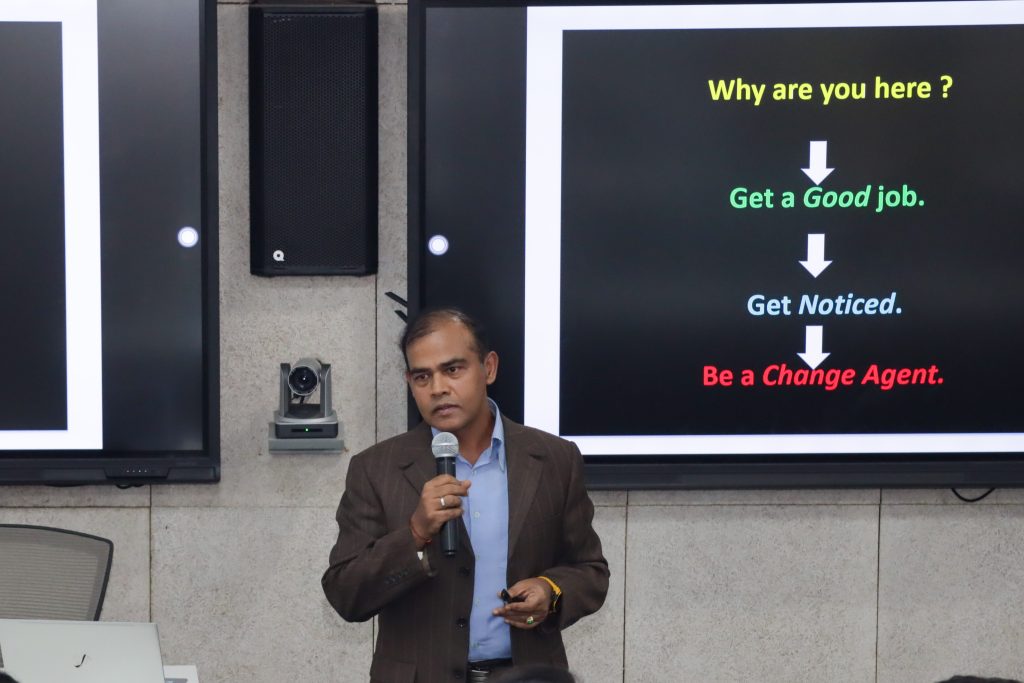
The Paari School of Business invited Mr Siddharth Tripathi, Founder and CEO of Skillizen Learning, for a Guest Talk on the “Seven Mantras of Entrepreneurship”. In the talk held on November 14, 2023, Mr Tripathi extensively discussed the key strategies and skills required to gain entrepreneurial success. He enlightened that the term ‘Entrepreneurship’ originates from the French language but derives its innermost inspiration from the Sanskrit word ‘Antah Prerna’. He enlightened the students that an entrepreneur should always have original and innovative ideas and sound domain knowledge.
During his session, Mr Tripathi stated, “The world belongs to the change agent” emphasising that young entrepreneurs must always focus on becoming change agents who can change the norms of the world. He also highlighted that there is no right strategy for successful entrepreneurship. The key to success in entrepreneurship is financial capital as well as social capital, as networking is crucial for the development of the company and critical to entrepreneurial success. Mr Tripathi encouraged budding ventures claiming that in the tortoise and rabbit race in entrepreneurship, the rabbit always wins, but the tortoise comes back with a solid stay, sharing that the fastest launcher will always be the first.
- Published in Departmental News, News, Paari Current Happenings
MSc Environmental Science Students Shines at 7th University Challenge
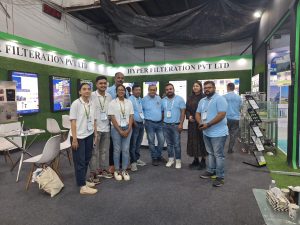
In a remarkable display of talent and dedication, three MSc Environmental Science students from the Department of Environmental Science and Engineering showcased their expertise at the 7th University Challenge, India, held on 18-19 October 2023 at the Bombay Exhibition Centre, Goregaon, Mumbai. Mr Om Banerjee, Ms Sejal Sudhir Kulkarni, and Ms Manaswini Mirthipati Subrahmanya exhibited exceptional knowledge and passion for environmental science at the event organised by the German Water and Waste Association (DWA) as a part of IFAT India 2023. IFAT- India is India’s acclaimed trade fair that showcases environmental technologies for sustainable solutions to problems in the subcontinent. The students interacted with professionals from diverse sectors, such as water, sewage, solid waste, and recycling, and explored their innovative solutions and services.
Their participation not only reflects their commitment to academic excellence but also underscores the Department’s dedication to nurturing top-tier talent in the field of environmental science. We extend our heartfelt congratulations to these students and anticipate their continued success in their academic and professional endeavors.
- Published in Departmental News, ENVS News, News
ICAFA 2023: Fight Against Antimicrobial Resistance
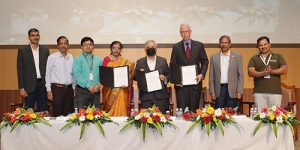 SRM University-AP successfully conducted a two-day International Conclave on Antimicrobial Resistance (ICAFA 2023) in collaboration with AMR Insights from The Netherlands, UK Innovate KTN, Global AMR Hub, Germany, Nitte (Deemed to be University), FABA and ICFAI where esteemed speakers and renowned researchers from across the world came together to address the critical issue of antimicrobial resistance and promote global health awareness.
SRM University-AP successfully conducted a two-day International Conclave on Antimicrobial Resistance (ICAFA 2023) in collaboration with AMR Insights from The Netherlands, UK Innovate KTN, Global AMR Hub, Germany, Nitte (Deemed to be University), FABA and ICFAI where esteemed speakers and renowned researchers from across the world came together to address the critical issue of antimicrobial resistance and promote global health awareness.
ICAFA 2023 acted as a premier platform for experts to share insights, exchange knowledge, and collectively develop actionable strategies to combat the pressing issue. The conclave proved to be a significant milestone in the field of healthcare by providing a common ground for multidisciplinary experts to engage in thought-provoking discussions like ways to make people aware of the right use of antibiotics and control measures to combat it. The event witnessed the presence of leading healthcare professionals, researchers, policymakers, and scientists like Dr Marteen Van Dongen, AMR Insights, Netherlands; Dr Simon Doherty, Queen’s University Belfast, UK; Dr Joanna Wiecek, CSO, CircaGene, UK; Dr Mandy Nevel, Head of Animal Health and Welfare, AHDB, UK; Dr Peter Coombs, LifeArc, UK; Dr Robin Cohen, Innovate UK; Prof. Ranga Reddy Burri, IFCAI, Prof Reddanna, FABD, Prof. Niyas Ahmed, Shanti Swarup Bhatnagar Fellow from the University of Hyderabad, Dr. Nagendra R. Hegde, NIAB and many more who showcased their expertise and shared groundbreaking research and measures in combating AMR. Acknowledging the pressing need for international collaboration and research to combat antimicrobial resistance, SRM University-AP extended its reach through a strategic partnership by signing an MOU with AMR Insights and NITTE (deemed to be the University).
In addition to the esteemed keynote address, an interactive panel discussion and press conference were organized, covering various aspects of antimicrobial resistance. The conference served as a platform for experts to make people aware of the emergence of drug-resistant infections, challenges in the reckless use of antibiotics, and innovative approaches to infection control because of the adverse effects.
Besides the main conference event on Thursday, three roundtables with themes on One Health, Therapeutics and Vaccines, and Diagnostics and Therapeutics were held, during which UK experts, Indian AMR researchers, experts from industry and startups, and representatives from the state medical colleges, AP government departments – health, animal husbandry, and Fisheries, discussed on the possibilities of UK- India collaboration efforts to combat AMR pathogens.
Concluding the International Conclave on Antimicrobial Resistance, dignitaries from SRM University-AP and other esteemed institutions released “10 Mantras to Combat Antimicrobial Resistant Microorganisms” These guidelines encapsulate the collective wisdom and recommendations of the experts present at ICAFA 2023, serving as a guiding light for healthcare professionals, policymakers, and the public in combating antibiotic resistance.
Prof. Manoj K Arora, Vice Chancellor, SRM University-AP, emphasized the institution’s commitment to addressing global health challenges and fostering interdisciplinary collaborations. Antimicrobial resistance is a complex issue that requires collective action. By hosting ICAFA 2023, SRM University AP aims to create a platform for fruitful discussions, research collaborations, and policy recommendations to combat this global health crisis.
Prof. Jayaseelan Murugaiyan, Associate Dean i/c (Sciences) SEAS and Head of the Biological Sciences Department, expressed his gratitude towards the participants and speakers for their contributions to this remarkable event. He stated, “ICAFA 2023 has provided us with a robust platform to collaborate, exchange ideas, and collectively address the challenges of antimicrobial resistance. We are confident that the knowledge shared and the strategies proposed during this conclave will pave the way for a healthier future.”
SRM University-AP’s successful organization of ICAFA 2023 demonstrates its commitment to fostering collaborative efforts in addressing global health challenges. By bringing together international experts and promoting public awareness, the university reiterates its dedication to advancing healthcare and finding tangible solutions to combat antimicrobial resistance.
- Published in Biology News, Departmental News, News, Research News
DST-FIST Grant of Rs 1.4 Crores for Mechanical Engineering Department
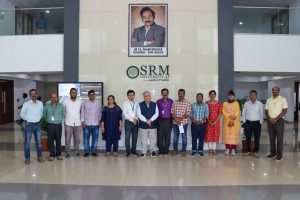
SRM University-AP shares a momentous achievement as the Mechanical Engineering department has been awarded a financial grant of Rs 1.4 crores under the prestigious FIST (Fund for Improvement of S&T Infrastructure) by DST (Department of Science and Technology) Government of India.
The equipment proposed under the FIST grant is High-Resolution X-ray Micro Computed Tomographic Scanner that will help Materials Scientists, Engineers, Manufacturers and Researchers investigate internal structures, pore flaws of metallic, polymer and ceramic samples/ components non-destructively. This state-of-the-art facility will promote R&D activities in new and emerging areas of Materials Science Engineering and Manufacturing. Additionally, it seeks to attract fresh talents to the university, fostering an environment of innovation and scientific excellence. The established facility will be available to internal and external users (from academic institutions, research labs, manufacturing Industries, MSMEs and Startups.
The grant, awarded for a duration of 5 years, is a testament to the unwavering commitment of SRM University-AP to providing cutting-edge resources for the advancement of scientific studies. This achievement results from the exceptional efforts put forth by the faculty members of the Department of Mechanical Engineering of the university. Their dedication, expertise, and commitment to academics and research played a pivotal role in securing this grant amidst tough competition.
Prof. Manoj K Arora, Vice Chancellor, SRM University-AP proudly remarked, “This grant will not only enhance our research capabilities but also provide a platform for our students and faculty members to explore new avenues in the field.” Prof. G S Vinod Kumar, Head of the Mechanical Department, expressed his delight that the grant will be utilised for advanced characterisation and diagnostic research in the area of Materials and Manufacturing. It will also be used to strengthen the postgraduate and doctoral research facilities in the mechanical engineering department.
The Institute applauds the Mechanical Engineering department for proving their mettle and emerging success among departments from various universities/institutes, both government-funded and private, in the national level competition for the DST-FIST grant. SRM University-AP is confident that this financial support will propel the Mechanical Engineering department to new heights of success and enable them to contribute significantly to the scientific community. The institution remains committed to fostering an environment that encourages research, innovation, and knowledge creation.
- Published in Departmental News, Mechanical Engineering NEWS, News, Research News
Field Visit for Environmental Awareness
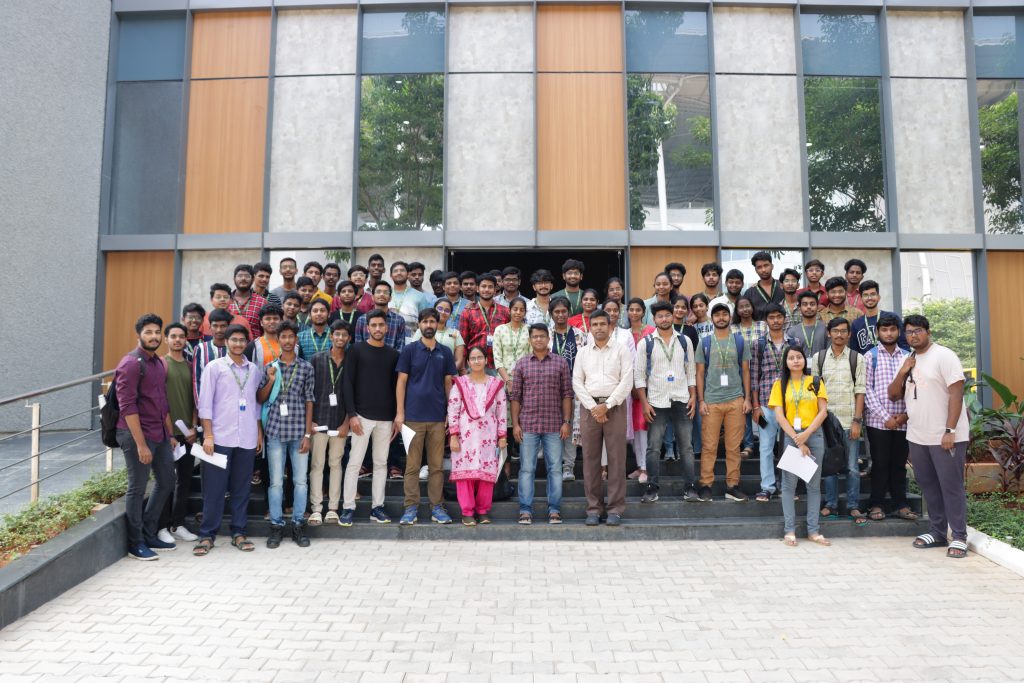
The Department of Environmental Science and Engineering organised a field visit for first-year odd semester students as a part of their Environmental Science course (VAC-101) from October 16-20, 2023 around the vicinity of SRM University-AP campus. The students were made aware of the surrounding land-uses, their biodiversity, impacts and importance to the environment. Observations were made on different threats like pollution, plant invasion, fertilizer run-off, etc. and the students were explained what can be done as an individual and as a community to protect our resources. Practical know-hows on vegetation and water sampling were also demonstrated by different faculty members. The students returned with a heightened sense of stewardship towards environmental protection.
- Published in Departmental News, ENVS News, News


